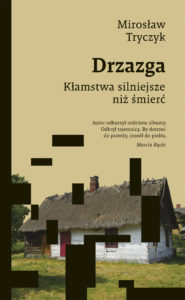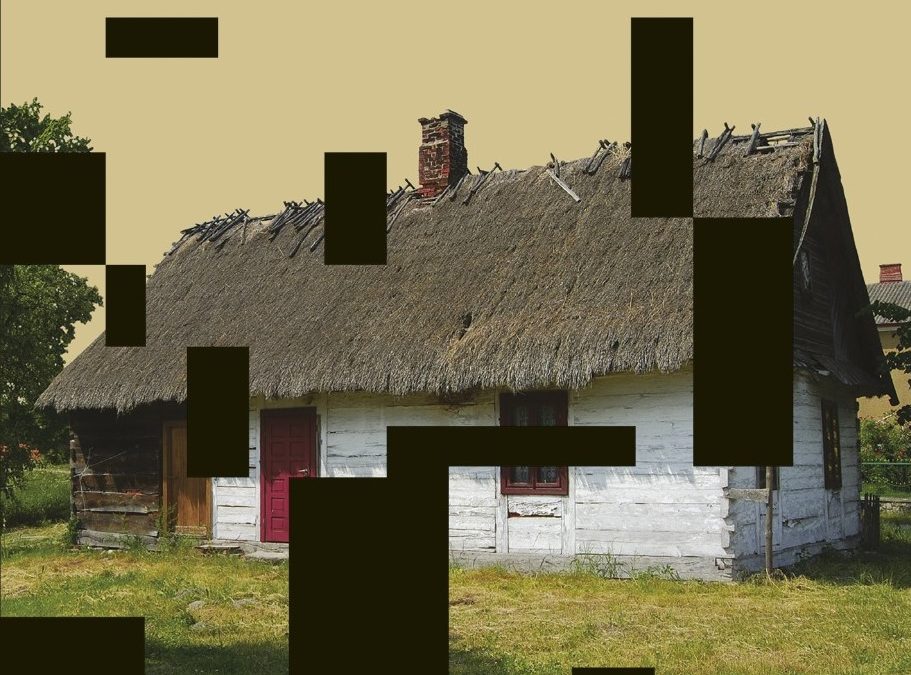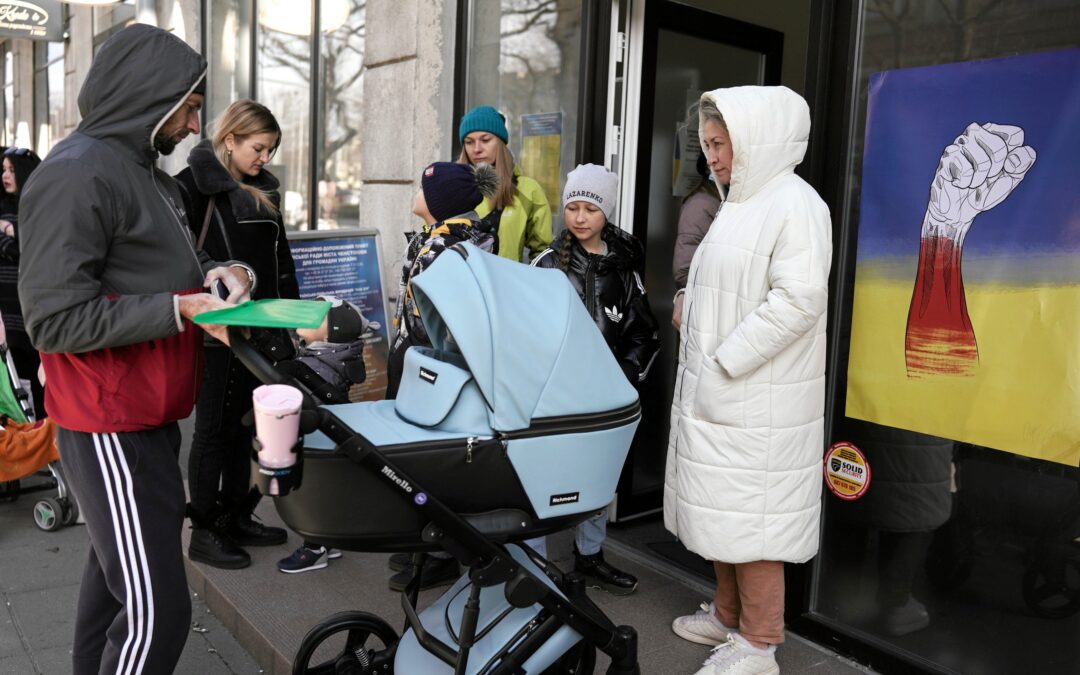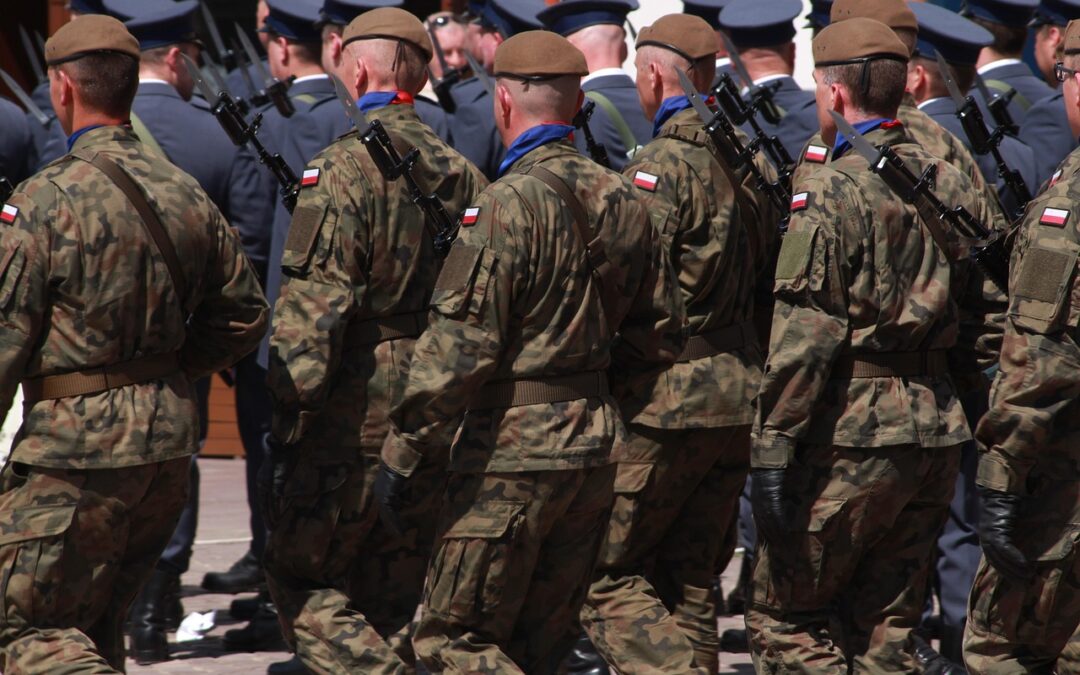As a boy, Mirosław Tryczyk received a mysterious bag of coins from his dying grandfather. Listening to the conversations of adults, he picked out disturbing words about his beloved relative. Like splinters, these words cut him so deeply that he made many attempts to uncover the history of his family from Podlasie, in north-east Poland, eventually discovering his grandfather’s involvement in pogroms in the village of Wólka Dobryńska.
In 2015, Tryczyk published the widely discussed book Towns of Death: Pogroms of Jews by their Neighbours (Miasta śmierci. Sąsiedzkie pogromy Żydów). His latest non-fiction work, published this year, is Splinter: Lies Stronger Than Death (Drzazga. Kłamstwa silniejsze niż śmierć). It depicts the struggles of family remembrance and denial, of coming to terms today with the awareness of what happened in the past, and of restoring the memory of the pogroms of Jews by their neighbours that took place in Podlasie in 1941-42, interweaving Tryczyk’s own family history with those of others.
Wywiad dostępny jest również w języku polskim.
Agnieszka Wądołowska: In your book Drzazga (Splinter) you portray the process of getting to know your family’s wartime history. You learn that your beloved grandfather murdered Jews during the Second World War. Why did you decide to write about that?
Mirosław Tryczyk*: The decision to write about my grandfather’s wartime past had been growing inside me for the past ten years.
In a sense, the need to face up to my family history was the leitmotif of my whole life and professional choices. The topic of racism, nationalism and antisemitism always came back to me. Especially in my work with young people.
When that need became more conscious, it resulted first in Towns of Death, which was not about my family at all. I had been running away from my family’s past. I wanted to learn my family history from the perspective of documents and witnesses’ recollections too. But I began to write about others, the histories of the villages of Radziłów, Szczuczyn, Bzury and Wąsosz, and by the time I’d finished, the need to write about myself was also ripe. Although at first I got scared and pulled out.
But you came back.
Yes. Travelling around the pogrom towns, first as an employee of the Jewish Historical Institute, and later as a writer, I realised that there were very many such family histories. There is a whole generation of forty-somethings trying to come to terms with the knowledge of what their grandparents did. Those grandparents are often dead, so we are left with just dialogues with their ghosts.
That was why I decided to write about those people too, how they deal with it, and how discussions on the families’ past proceed in their communities. What their conversations at home look like, and how they look when they try to have them outside.
In the end, the history of my grandfather turned out to be just a pretext for talking about a broader perspective, the cities, places, and houses that are marked by atrocity and the people imprisoned in the past, and how they try to deal with it.
We can find similar personal histories in literature abroad, but not in Poland. The scholar Joanna Tokarska-Bakir wrote that in Splinter you break with “the decorum accepted in Poland, setting a standard of honesty unheard of in Polish literature making it possible to tell a truth blocked by false loyalties”.
That is a sign of where we have got to. The book’s subtitle is “Lies stronger than death”, and it is very interesting that in Poland after the Second World War there are many histories that we didn’t tell each other at all.
The history books written in the west of Europe were mainly based on so-called oral history. Witnesses, the people who survived the war and the Holocaust, were asked what they had experienced in that time. The Polish discourse is based on documents. We had millions of witnesses, and we didn’t ask them anything.
It wasn’t a priority in communist Poland.
Sure, the historical policy of the Polish People’s Republic was based on triumphalism and emphasising our role as victims. But for me that still doesn’t explain the phenomenon of the lack of personal accounts and stories about what people experienced during the war.
What I try to do is to visit those witnesses who are still alive. Usually they are people who in 1941, the year I am writing about, were children, and then grew up in pogrom towns listening to stories from family or neighbours, which turned them into, let’s say, “secondary witnesses”.
Since 1989 many books have been written about the Holocaust, but there are surprisingly few in which people are actually asked what happened – they are solely based on the objectivism of documents.
But it is in the memories of specific people that the entire complexity of those years reverberates. So in my book we have the story of Anna Wasilewska, which dispels the myth of the Righteous [Among the Nations, those honoured for saving Jews from the Holocaust] supported by those around her. Anna hid Jews and by no means walked around her village bathed in glory, but was killed for it by the partisans.
Yet for years nobody talked about her story.
Experts on genocide make it clear that the last stage is always distorting and denying what happened.
Incidentally, similar occurrences took place in Germany, France, Holland, Belgium, everywhere the local population took part in the Holocaust. In Poland very few stories of witnesses and their families survived. I managed to reach such people. I myself am from such a family.
Did that help you in your interviews?
Perhaps I understood them a little better. Because the fact that one family member murdered someone does not mean that all the others are guilty. In Poland as a whole we aren’t aware of the scale of complicity of our ancestors in these murders and looting, and we need to start talking about it.
We need to?
Yes, because these histories scream at us. In the pogrom towns, the bones of the dead are emerging from the ground. It’s returning. We try to cover them up, but they return.
The current triumphalist, exclusivist, nationalist politics of memory depicting Poles only as heroes also slows down this process of understanding what really happened.
You write about the people trying to understand that, but also those whom you meet when tracing the history of the pogroms. In a sense you force them to confront their families’ past, presenting them with files from the Institute of National Remembrance (IPN), telling them stories you have heard about the relatives. Why do you think you have the right to do that?
In my work on the Holocaust in the last ten years I don’t think I’ve ever met anyone who actually found out from me what happened in their family. I support that knowledge if I have the chance. Usually they know some fragment of history or suspect something, and I just fill in the gaps.
The families in which murders of Jewish neighbours took place have some kind of awareness that it happened. One way or another, as part of the trauma of the family lies or comments from the family – don’t ask, don’t be curious, why would we want to talk about the war, don’t go behind that barn or to the woods, because it’s frightening…
Sometimes people would only begin to talk, for example, when we were in the forest, face to face, when they knew that their neighbour wasn’t eavesdropping. Then suddenly someone would say they knew where the pit with the bodies was. So this is only an apparent confrontation, in my view.
But it’s important, because often in families there is denial, people tell themselves, “No, it’s impossible, Grandad was great”, and then the files emerge, and they have to react to them somehow. I think that it is important simply to find out the truth.
How does one live with this horror afterwards?
I don’t know, especially when that horror is so close to home. How can you face up to the truth that one of your ancestors chopped 20 people’s heads off, as was the case in Szczuczyn? That is a kind of monstrosity that no one can accept.
I come from Wrocław, which is a safe place for me. I know that it wasn’t my grandparents who killed there. But everywhere that life has been going on for generations, the bones of victims are still nearby.
I remember the story of a girl from the village of Dzięgiele growing up near a pit containing the bodies of Jews murdered by her grandfather. The children run around playing, walking around on the wood.
But it’s also important to realise that grandchildren are not responsible for the actions of their grandparents, that it is not their shame. How can you be ashamed of an ancestor that you perhaps didn’t even know?
The first instinct would seem to be to punish the perpetrators, but in many cases it’s too late for that. What else?
Firstly, not all the perpetrators are dead. Although it’s true they are of an age when it is too late for justice. The question remains what was done in the last 75 years. After the war a number of investigations were made, but in most cases there was little or no punishment.
Institutions’ sluggishness, investigations dragging on, inappropriate classification of acts, suspension of procedures even without rulings being made – as a result of all of this, when I go to the parish priest in Radziłów today and try to talk to him about the pogrom, he tells me that privately he knows what happened, but he won’t speak about it from the pulpit because he doesn’t know the Polish state’s position on the matter.
Similarly, a schoolteacher told me that she absolutely doesn’t mention the subject of the crimes committed by the local population towards their Jewish neighbours because it’s not in the curriculum. The current situation in the pogrom towns can almost be compared to the situation in Sicily.
To the mafia?
Yes, the ancestral alliances, the mutual family and local loyalty are very strong. That is why it is very hard to find the truth all these years later. People have changed names, emigrated.
So what are we left with?
I dream of a situation in which we could say that Poland is a country that knows its complex history, that Polish academics work on it free from censorship, influences and constraints, and teachers educate the young generation and teach them about these events, not only in Jedwabne, but also in Wrocław and Warsaw, that the police fight against nationalist extremism, ensuring that antisemitism and hate crimes can never be repeated, and that monuments display the truth rather than inscriptions denying reality.
I also dream of a situation in which the prime minister, president and representatives of the authorities such as the mayor of Jedwabne or Radziłów [where pogroms took place] will meet with residents at the monuments on the anniversary of the pogrom to pray together.
It is not about apologising for the atrocities, because it’s not our fault. We do not have to apologise. But perhaps we ought to apologise for the neglect and silence.
I apologise for my grandfather and my own neglect. Perhaps I should have written the book a long time ago? But it would be very important for the great and the good in the country as well as the local residents to do so.
You speak of reconciliation, but the Polish narrative in this period seems broken. There are stories about murderers, looters, post-Jewish property, priests stoking antisemitism, and on the other hand those about heroes risking their lives, the Righteous Among the Nations, and brave partisans. What can be done for these two narratives to meet, to transect somewhere?
The person with the answer to that question will win a lot. Although I don’t think that’s quite the case. It’s true that we seem to have two narratives, two truths about those times. At the moment, the deniers’ camp is much stronger.
But I think that there are many people of good will on both sides. Despite appearances, there is a large room to meet. I wanted Splinter to be one such meeting, because in it I speak to people who you might expect to put on the other side of the barricade. But I meet them and we talk.
I am from the Podlasie region myself – or my family is – and I often go there. And it is possible to talk. I stand with somebody over a death pit, and the situation is always so horrendous that very few can endure it and continue to lie.
The main problem, of course, is politicians using the history of the Holocaust and the history of post-Jewish property for their own purposes. As long as this dispute has a political dimension, it will not fizzle out. There will be attempts to criminalise academic research by such laws as the one about the IPN, and incorrect inscriptions will remain on monuments.
But you ask how to reconcile those narratives? The local work seems very important. In somewhere like Szczuczyn or Radziłów there’s a kind of intra-Polish war of remembrance going on.
And perhaps it is worth me saying that those who shout about how many heroes we had are right too. It’s true that there were also many heroic deeds. The thing I can’t agree to is the excessive glorification of the Polish nation.
So why, ask your critics, don’t you write about those heroes, those “from the other side of the barricade”?
That charge is indeed levelled at me, but I can’t fathom it at all. Am I supposed to cite files in which someone talks about saving Jews for the sake of symmetry? Or letters in which the residents of Jedwabne write what the Germans did, just to obscure the truth? What would be the purpose of that symmetry and artificial balance?
Where there were crimes, you need to write about crimes, where there were heroes, you have to write about heroes. Good books need to be written about the truth. I write about the pogrom towns.
But how can one write books to bring about the wise dialogue you yourself speak about? It is 20 years since the publication of Jan Tomasz Gross’s Neighbours, which opened the debate in Poland about Polish guilt. In Splinter you show young people from Jedwabne who feel that the place and its residents have become stigmatised.
The question is: could this debate have taken place in any other way?
For many, Gross’s book was a shock, dispelling the myths built over the years. The intelligentsia were able to respond to it by writing essays and treatises, but locally, national-patriotic moods were reinforced and the past was denied.
In a certain sense, the dispute became class-based, and that was a mistake, although nobody was at fault. The intelligentsia discussed it with itself in weekly magazines, at universities, but no one discussed it with the residents of these places. Very few people made efforts to go to Jedwabne, Radziłów or Szczuczyn and talk to the people there.
Because in those villages, in the public domain, not in private, but in public, the crimes that Gross writes about were denied. What was lacking was work with local memory, activists, psychologists, and historians prepared to be there and act.
What was also lacking was making the awareness public, bringing the debate and knowledge to the local sphere. And as a result, the voices of deniers of the Holocaust and Polish participation in the pogroms appeared. At first, they were marginal, they didn’t reach universities, but the change in mood meant they became a tool of the political struggle and joined the mainstream.
I was once talking to Gross about how the history of the neighbours is so distorted that Jedwabne was by no means the most important in this series of pogroms – it also wasn’t the bloodiest. And what happened at Jedwabne also wasn’t crucial for understanding all the processes in Podlasie.
The residents of Jedwabne felt hurt by it in a way. Not only were they put in the public eye, but also nothing was said publicly about similar places. And this all seemed very important in these areas – “they’re talking about us, but not about others”. And nationalist circles jumped on that to drive their denialist narrative.
The worst thing is that 20 years have passed, and the inscriptions on monuments are unchanged, the bodies still lie, unfound and without graves, and not a word is said about it in schools.
Are you not concerned that Splinter could be received in a similar way? It mentions the names of villages and of perpetrators.
I’m aware of this shame associated with family trauma, so in my previous book, Towns of Death, I anonymised all my interlocutors’ names for that very reason, in order to avoid accusations of stigmatisation and denial from families. Incidentally, I encountered a similar approach when speaking to one of the protagonists of Splinter. Her mother admitted that Jews had been murdered in Radziłów, she just didn’t want it to be written that somebody from their family had done it.
But the criticism I received for this anonymisation led me to the conclusion that it makes sense to write about the perpetrators by name. Hiding the names and places they come from allows the denial and disavowal to continue.
It’s a paradox, because after Towns of Death many people wrote to me asking whether so and so didn’t happen to be such and such old man from such and such place, because everyone there knew he’d taken part.
Have you received letters since Splinter too?
Yes, but they are completely different. What most moved me were the letters from Jedwabne residents thanking me for showing their perspective, showing how they felt in these years since Neighbours was published.
But you know, there’s one more reason why it is worth using the perpetrators’ names. I was once talking to Professor Tokarska-Bakir in the context of her book about the pogrom in Kielce, where she also gives perpetrators’ names. As a result, these books also become material for other historians.
Exactly, even after Towns of Death, you were rebuked for not being a historian and lacking the appropriate methodology.
What can I say? Gross was also a sociologist first, and neither Barbara Engelking, Anna Bikont nor Joanna Tokarska-Bakir [other leading Polish Holocaust scholars] is a historian, and does that matter for their work? In Holocaust research, you need to have a very broad humanities-based knowledge of psychological, social, and political processes, because you have to describe people in the “critical situation” of a crime, and the Holocaust was the most atrocious crime.
So we see that all these authors dealing with pogrom history are mostly not actually historians. The question is: where are the historians? Why do those who have the necessary academic titles and tools not deal with Polish participation in the Holocaust?
Incidentally, Splinter is not a history book, it is more of a reportage. I very much wanted to achieve a similar effect to Władysław Pasikowski’s film Aftermath. To tell these stories in as simple and credible way as possible, to reach as many readers as I could.
Maciej Stuhr, who plays one of the main parts in Aftermath, encountered a wave of animosity and abuse after the film’s premiere. Did you have similar problems after Splinter and Towns of Death?
After Towns of Death there was a lot of that. It was mostly anonymous messages, comments on forums or social media, suggesting I was Jewish or had sold out to one lobby or another, and there were threats too. I lost one or two jobs.
After Splinter, the vast majority of letters and emails I received were positive: thank you, I have similar struggles, in my family too this and that, and you know…There are many such expressions of support.
Writing Splinter, I hoped that it would give respite to those living similar stories, provide some relief that at last someone had said it out loud, and that in somewhere like Szczuczyn it would simply become easier to talk.

*Mirosław Tryczyk is a doctor of humanities, philosopher, author of Towns of Death: Pogroms of Jews and Splinter. Lies Stronger Than Death. For his work promoting intercultural tolerance, as well as educational and anti-discrimination activities, he was nominated for the Polin Museum award in 2019.
Main credit image: Wydawnictwo Znak

Agnieszka Wądołowska is deputy editor-in-chief of Notes from Poland. She is a member of the European Press Prize’s preparatory committee. She was 2022 Fellow at the Entrepreneurial Journalism Creators Program at City University of New York. In 2024, she graduated from the Advanced Leadership Programme for Top Talents at the Center for Leadership. She has previously contributed to Gazeta Wyborcza, Wysokie Obcasy and Duży Format.




















